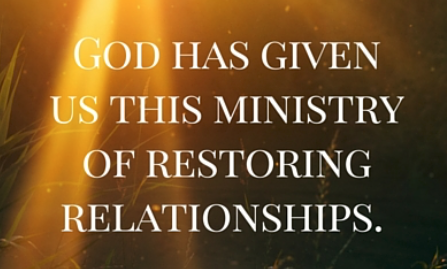
Repentance-free Forgiveness?
And all these things are from God who reconciled us to himself through Christ, and who has given us the ministry of reconciliation. In other words, in Christ God was reconciling the world to himself, not counting people's trespasses against them, and he has given us the message of reconciliation. (2 Corinthians 5:18,19 NET)
In the following verses, Jesus is clarifying that we are to have a “forward lean” or bias to quickly and repeatedly forgive others (1).
Then Peter came to him and said, "Lord, how many times must I forgive my brother who sins against me? As many as seven times?" Jesus said to him, "Not seven times, I tell you, but seventy-seven times! (Matthew 18:21-22 NET)
Therefore, as the elect of God, holy and dearly loved, clothe yourselves with a heart of mercy, kindness, humility, gentleness, and patience, bearing with one another and forgiving one another, if someone happens to have a complaint against anyone else. Just as the Lord has forgiven you, so you also forgive others. (Colossians 3:12-13 NET)
However, forgiveness cannot be received without genuine repentance. (Luke 13:3-5)
Watch yourselves! If your brother sins, rebuke him. If he repents, forgive him. Even if he sins against you seven times in a day, and seven times returns to you saying, 'I repent,'you must forgive him." (Luke 17:3-4 NET)
While we are to have a bias to forgive and express this to our Heavenly Father, realize this grace for forgiveness received from God for the other party is essentially held in a Heavenly escrow account until they repent. (Matthew 6:19,20)
For example, while Jesus was hanging on the cross, He asked His Father to forgive them; however, they did not receive forgiveness until they repented on the day of Pentecost. That is, Jesus was requesting His Father to give them an opportunity to repent (i.e., a way out of their sin(s) 1 Corinthian 10:13) so they could be forgiven since they did not realize they were crucifying the Lord of Glory.
Juxtaposed to before the cross, Jesus immediately forgave the sins of all that came to Him in faith, repenting, and consequently, they received forgiveness. (Mark 2:5-12. Hebrews 11:6)
But Jesus said, "Father, forgive them, for they don't know what they are doing." Then they threw dice to divide his clothes. (Luke 23:34 NET)
Peter said to them, "Repent, and each one of you be baptized in the name of Jesus Christ for the forgiveness of your sins, and you will receive the gift of the Holy Spirit. For the promise is for you and your children, and for all who are far away, as many as the Lord our God will call to himself." With many other words he testified and exhorted them saying, "Save yourselves from this perverse generation!" So those who accepted his message were baptized, and that day about three thousand people were added. (Acts 2:38-41 NET)
Similarly, we are to ask for forgiveness for others that have wronged, and in doing so, we demonstrate that our heart is in the right place by being quick to forgive. Again, no forgiveness is given to them until they repent but rather, God our Father places this forgiveness in escrow for them and arranges an opportunity for them to repent to receive it. Nevertheless, we free ourselves (1) the moment we go before God with the willingness to forgive them and seek His grace and mercy of forgiveness from Him for them. (Matthew 6:14,15)
If anyone sees his fellow Christian committing a sin not resulting in death, he should ask, and God will grant life to the person who commits a sin not resulting in death.... (1 John 5:16 a NET)
I believe the words “grant life” in verse above refers to a way out of the sin(s) arranged by God, beyond what justice dictates due to grace and mercy that is given as a result of our intercession, for the individual to repent and thereby receive forgiveness.
No trial has overtaken you that is not faced by others. And God is faithful: He will not let you be tried beyond what you are able to bear, but with the trial will also provide a way out so that you may be able to endure it. (1 Corinthians 10:13 NET)
For judgment is merciless for the one who has shown no mercy. But mercy triumphs over judgment. (James 2:13 NET)
Furthermore, this is the same for salvation as Jesus paid the price for the sins of all the world for all time and placed this grace for forgiveness for all in escrow. (1 John 2:2) However, this will not be of utility to those that do not repent and choose to follow Jesus as their Lord. (John 3:16-18)
Therefore repent and turn back so that your sins may be wiped out, so that times of refreshing may come from the presence of the Lord, and so that he may send the Messiah appointed for you– that is, Jesus. (Acts 3:19,20 NET)
because if you confess with your mouth that Jesus is Lord and believe in your heart that God raised him from the dead, you will be saved. For with the heart one believes and thus has righteousness and with the mouth one confesses and thus has salvation. (Romans 10:9,10 NET)
So, what does it mean to repent? Glad you asked!
“Repent is the translation of metanoeo, which in classical Greek meant “to change one’s mind or purpose, to change one’s opinion.” …The noun metanoiameant “a change of mind on reflection.” In the New Testament, they refer to a change of moral thought and reflection which follows moral delinquency. This includes not only the act of changing one’s attitude towards and opinion of sin but also that of forsaking it. Sorrow and contrition for sin are included in the Bible idea of repentance, but these follow and are consequent upon the sinner’s change of mind concerning it… The act of repentance is based first of all and primarily upon an intellectual apprehension of the character of sin, man’s guilt with respect to it, and man’s duty to turn away from it. The emotional and volitional aspects of the act of repentance follow and are the result of this intellectual process of a change of mind with respect to it. This means that the correct approach of the Christian worker to a sinner whom he wishes to lead to the Lord is that of clearly explaining the issues involved. When the unsaved person is made to clearly understand the significance of sin, the intellectual process of changing his mind with respect to it can follow, with the result that sorrow, contrition, and turning away from it will also follow. A mere emotional appeal to the sinner is not the correct one. The Greek word metanoeo tells us that the intellectual appeal must come first since the act of repenting is basically a mental one at the start.” (3)
Overlooking Offenses
Realize, if someone has offended you, it is also Biblical to overlook minor offenses. (Acts 17:30)
A fool's annoyance is known at once, but the prudent overlooks an insult. (Proverbs 12:16 NET)
A person's wisdom makes him slow to anger, and it is his glory to overlook an offense. (Proverbs 19:11 NET)
However, an offense should be overlooked only if you can answer “no” to all of the following questions: (2)
- Is the offense seriously dishonoring God?
- Has it permanently damaged a relationship?
- Is it seriously hurting other people?
- Is it seriously hurting the offender himself? (2)
If you answer “yes” to any of these questions, an offense is too serious to overlook, in which case God commands you to go and talk with the offender privately and lovingly about the situation. (2)
"If your brother sins, go and show him his fault when the two of you are alone. If he listens to you, you have regained your brother. Matthew 18:15 NET)
Brothers and sisters, if a person is discovered in some sin, you who are spiritual restore such a person in a spirit of gentleness. Pay close attention to yourselves, so that you are not tempted too. Carry one another's burdens, and in this way you will fulfill the law of Christ. (Galatians 6:1,2 NET)
Seven A’s of Confession
As God opens your eyes to see how you have sinned against others, he simultaneously offers you a way to find freedom from your past wrongs. It is called confession. Many people have never experienced this freedom because they have never learned how to confess their wrongs honestly and unconditionally. Instead, they use words like these: “I’m sorry if I hurt you.” “Let’s just forget the past.” “I suppose I could have done a better job.” “I guess it’s not all your fault.” These token statements rarely trigger genuine forgiveness and reconciliation. If you really want to make peace, ask God to help you breathe grace by humbly and thoroughly admitting your wrongs. One way to do this is to use the Seven A’s. (2)
If you have committed an offense against someone, then the following provides guidance for seeking reconciliation:
1. Address everyone involved (All those whom you affected)
2. Avoid if, but, and maybe (Do not try to excuse your wrongs)
3. Admit specifically (Both attitudes and actions)
4. Acknowledge the hurt (Express sorrow for hurting someone)
5. Accept the consequences (Such as making restitution)
6. Alter your behavior (Change your attitudes and actions)
7. Ask for forgiveness (2)
Why do you see the speck in your brother's eye, but fail to see the beam of wood in your own? Or how can you say to your brother, 'Let me remove the speck from your eye,' while there is a beam in your own? You hypocrite! First remove the beam from your own eye, and then you can see clearly to remove the speck from your brother's eye. (Matthew 7:3-5 NET)
If we say we do not bear the guilt of sin, we are deceiving ourselves and the truth is not in us. But if we confess our sins, he is faithful and righteous, forgiving us our sins and cleansing us from all unrighteousness. (1 John 1:8,9 NET)
The one who covers his transgressions will not prosper, but whoever confesses them and forsakes them will find mercy. (Proverbs 28:13 NET)
Four Promises of Forgiveness
Through forgiveness God tears down the walls that our sins have built, and he opens the way for a renewed relationship with him. This is exactly what we must do if we are to forgive as the Lord forgives us: We must release the person who has wronged us from the penalty of being separated from us. We must not hold wrongs against others, not think about the wrongs, and not punish others for them. (2)
Therefore, forgiveness may be described as a decision to make four promises: (2)
1. “I will not dwell on this incident.”
2. “I will not bring up this incident again and use it against you.”
3. “I will not talk to others about this incident.”
4. “I will not let this incident stand between us or hinder our personal relationship.” (2)By making and keeping these promises, you can tear down the walls that stand between you and your offender. You promise not to dwell on or brood over the problem or to punish by holding the person at a distance. You clear the way for your relationship to develop unhindered by memories of past wrongs. (2)
This is exactly what God does for us, and it is what he calls us to do for others. (2)
Instead, be kind to one another, compassionate, forgiving one another, just as God in Christ also forgave you. (Ephesians 4:32 NET)
So, does God remember our sins that He has forgiven?
Again, glad you asked!
As far as the eastern horizon is from the west, so he removes the guilt of our rebellious actions from us. (Psalms 103:12 NET)
I, I am the one who blots out your rebellious deeds for my sake; your sins I do not remember. (Isaiah 43:25 NET)
People will no longer need to teach their neighbors and relatives to know me. For all of them, from the least important to the most important, will know me," says the LORD. "For I will forgive their sin and will no longer call to mind the wrong they have done." (Jeremiah 31:34 NET)
He has destroyed what was against us, a certificate of indebtedness expressed in decrees opposed to us. He has taken it away by nailing it to the cross. (Colossians 2:14 NET)
"For I will be merciful toward their evil deeds, and their sins I will remember no longer." (Hebrews 8:12 NET)
then he says, "Their sins and their lawless deeds I will remember no longer." (Hebrews 10:17 NET)
Receiving Self Forgiveness
Lastly, do not forget to receive forgiveness for yourself of wrongdoing after you have repented to God and others involved and received their forgiveness. If you refuse to receive forgiveness for yourself, you are declaring that the Gift of God’s unique Son Jesus shedding His sinless blood on the cross was not sufficient for you!
Dear hearts, Jesus died and was raised for all of our sins! Hallelujah!
Then I confessed my sin; I no longer covered up my wrongdoing. I said, "I will confess my rebellious acts to the LORD." And then you forgave my sins. (Selah) (Psalms 32:5 NET)
On Becoming a Disciple of Christ
- Credentials of Jesus as the Messiah through Fulfilled Prophecy
- The Sign Given to the Shepherds
- God is For, With, and In Us!
- Our Shepherd
- Crushed, not Broken
- No Death, Resurrection, and Ascension – No Salvation
- Redeemed by the Blood of Jesus
- None Has Been Forgiven Little
- Repentance-free Forgiveness?
- Choose to be the Chosen
Shalom
(Security, Wholeness, Success)
Peace
Then he said to them, “Therefore every expert in the law who has been trained for the kingdom of heaven is like the owner of a house who brings out of his treasure what is new and old.” (Matthew 13:52 NET)
(1) Select the link to open another article with additional information in a new tab.

2) Reprinted or adapted from Peacemaker® Ministries. https://pm.training or Adapted from The Peace Maker: A Biblical Guide to Resolving Personal Conflict, 3rd Edition by Ken Sande (founder of Peacemakers Ministries and Relational Wisdom 360 Ministries), ISBN 0-8010-6485-6
(3) Wuest’s word studies from the greek new testament: Studies in the vocabulary of the greek new testament, pp. 27,28, Kenneth S. Wuest, Wm B. Eerdmans Publishing Company, Grand Rapids, Michigan 49502, 1999, ISBN-13: 978-0802822802



